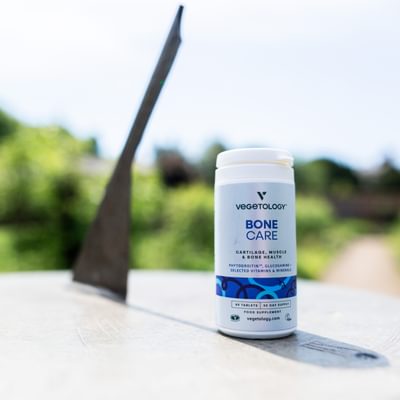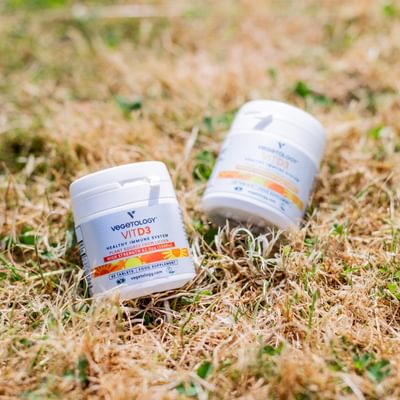

Like most of us you were probably told to drink up your milk as “it was good for your bones”.
Well, it’s true. Milk does contain calcium and calcium is a major component in building strong, healthy teeth and bones. Yet there are many other sources of calcium that can help our health too.
Calcium isn’t just vital to our bone building structure though; it also plays a significant role in the regulation of the heart muscles making sure that the heart is able to contract and pump blood around the body. Alongside Vitamin K, calcium also ensures that our blood manages to clot correctly. Taking calcium from our diets or from calcium tablets alongside some other supplements can bring added benefits and result in strong bones and a healthy heart as well as a stronger body overall.

Why is calcium important?
Calcium is one of the most important minerals our body can consume. Alongside vitamins like iron and vitamin D, it’s important to keep our bodies strong and healthy.
Our bodies cannot produce calcium on their own. Almost all calcium in the body is stored in bones and teeth, giving them structure and hardness. For our bones, a proper level of calcium in the body over a lifetime can help prevent osteoporosis which can result in brittle bones that easily break and fracture.
Your body also needs calcium for muscles to move and for nerves to carry messages between your brain and every part of your body. It also plays a huge role in blood clotting, helping muscles to contract, and regulating normal heart rhythms and nerve functions.
What are the health benefits of calcium?
Calcium brings important health benefits for the body. Our bodies use calcium to build and maintain strong bones. The health benefits include helping the heart, muscles and nerves to function properly.
Some studies suggest that calcium, along with vitamin D, may have benefits beyond bone health and even protect against cancer, diabetes and high blood pressure.
The list of health benefits for calcium is extensive, but includes:

What are the best sources of calcium?
As the body cannot make calcium, it can only get the calcium it needs through the food we eat or from calcium supplements. For many people, the best amounts of calcium can come from what they eat in their diet.

Good sources of calcium include:
How much calcium should I have each day?
Adults aged 19 to 64 and over need 700mg of calcium a day. You should be able to get all the calcium you need from your daily diet.
Yet you can have too much calcium. For guidance, adults ages 19 through 50 should not get more than 2,500 mg calcium total per day including food and supplements. Adults over age 50 should not exceed 2,000 mg total per day. Dietary calcium is considered safe, but too much calcium in the form of supplements might have some health risks.
What are the symptoms of a lack of calcium?
Calcium is so important for keeping your heart beating and your brain going that when we don’t have enough in our diets, the body takes it from our bones. Having low levels of calcium can have an impact on our health and often we won’t realise we’re missing calcium until signs start to show. This can be symptoms of calcium deficiency such as an unexpected fracture or loss of a tooth.
Symptoms can include:

If you are concerned about any of these symptoms, then seek help or advice from your doctor.
You can’t usually feel calcium deficiency and many people do not know when they are not getting enough. Your doctor may ask you to have a bone density test to look at how much calcium you have in bone, or ask specific questions about your diet to learn how much calcium you typically eat. If you have low calcium or loss of bone, it is important that you follow up with your doctor for lab tests and other recommended care.
Over time a lack of calcium can have a detrimental impact on health. This can include the loss of calcium from bone called osteopenia when it is mild and osteoporosis when it is severe. If calcium deficiency continues over a long time, you can have permanent loss of bone that can result in fragility, broken bones and loss of mobility.
How can vegans get more calcium?
Vegans might have trouble reaching their recommended daily intake of calcium because they don't consume dairy. Vegans can also be missing other vital vitamins including vitamin B12, iron, and zinc so a multivitamin can be helpful to take daily.

From their diet, good sources of calcium for vegans include:
It can still be hard for vegans to get enough calcium in their diets due to the lack of dairy. They might consider adding a vegan calcium supplement to their diet to help improve their intake.
The importance of supplements for calcium
Calcium carbonate supplements tend to be the best value, because they contain the highest amount of elemental calcium (about 40% by weight). Because calcium carbonate requires stomach acid for absorption, it's best to take this product with food.
Calcium supplements may offer benefits in reducing the risk of certain diseases, including colon cancer and high blood pressure.


What supplements should you take calcium with?
To absorb calcium, your body also needs vitamin D. A few foods naturally contain small amounts of vitamin D, such as canned salmon with bones and egg yolks. You can also get vitamin D from fortified foods and sun exposure.
Since calcium can affect how your body absorbs iron, it can also affect the absorption of zinc and magnesium too. It's helpful to take them together in a multivitamin, which typically contains smaller doses of these minerals. However, it's best to space out these supplements if you're taking them individually such as separate iron supplements and in larger quantities.
Are there side effects to calcium supplements?
Calcium supplements cause few, if any, side effects. However, when side effects do happen these can include gas, constipation and bloating.
In general, calcium carbonate as a supplement is the most constipating. To ease the discomfort, take part of your calcium dose in the morning and the rest later in the day, this may reduce the stress on your intestines and ease constipation.
What are the signs of too much calcium?
It is possible to have too much calcium, and this can influence our health. Other side effects of high calcium levels include:
If you’re worried you have had too much calcium then it can be helpful to speak to your doctor and seek medical advice.

